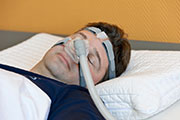- EPA Earmarks $3 Billion to Replace Lead Pipes Nationwide
- Johnson & Johnson Will Pay $6.5 Billion to Settle Talc Ovarian Cancer Lawsuits
- No Sign of Bird Flu in Ground Beef, USDA Says
- U.S. Maternal Deaths Declined in 2022
- Economy, Election Spur Rising Anxiety Among Americans in 2024
- Day Care Pick-Up Often Involves Sugary Snacks, Study Finds
- A Third of Young Adults Still Believe ‘Tan Is Healthier’ Myth: Survey
- MRNA Vaccine Fights Deadly Brain Tumor in Small Trial
- AI Won’t Replace ER Doctors Anytime Soon: Study
- Sleep Apnea Linked With Late-Life Epilepsy
CPAP Mask Success May Depend on Family Support, Study Finds


People struggling with sleep apnea who turn to the CPAP mask for help may do better if they get support from partners and family members, a new study shows.
“Having healthy relationships with family members can create an environment that supports the patient’s use of CPAP,” study lead author Faith Luyster, a research assistant professor in the School of Nursing at the University of Pittsburgh, said in an American Academy of Sleep Medicine news release.
Millions of Americans experience the snoring and interrupted nighttime breathing of sleep apnea. Continuous positive airway pressure (CPAP) therapy helps keep a person’s airway open by providing a stream of air through a mask that is worn during sleep. Many patients find the mask uncomfortable, however, affecting treatment adherence rates.
In the new study, Luyster’s team tracked 253 patients with obstructive sleep apnea who were prescribed CPAP therapy. These individuals were monitored for three months to determine if they used the mask device nightly.
People who were married or living with a partner were more likely to use CPAP regularly than those who were single, the team found. Patients with better family relationships also had better CPAP adherence than those with poor family relationships.
“This is the first study to explore the role of family factors in CPAP adherence,” Luyster said.
Based on the results, she believes that interventions that involve the patient’s family in sticking with the CPAP device “may help patients who would benefit from family support during the initial treatment period.”
The study was published online recently in the journal Sleep and was also scheduled for presentation at this week’s annual meeting of the Associated Professional Sleep Societies in Minneapolis.
More information
The U.S. National Heart, Lung, and Blood Institute has more about CPAP.
Source: HealthDay
Copyright © 2024 HealthDay. All rights reserved.










